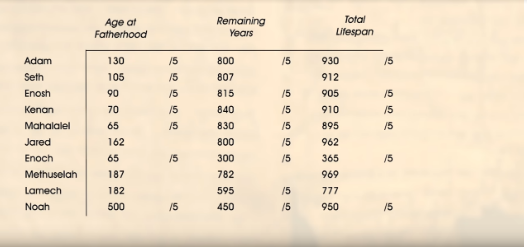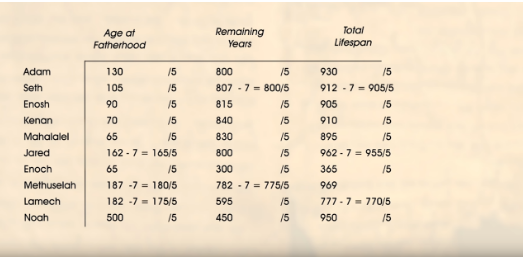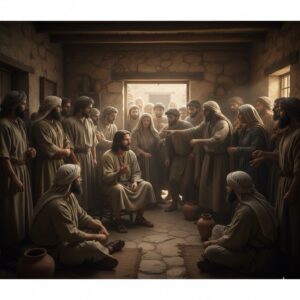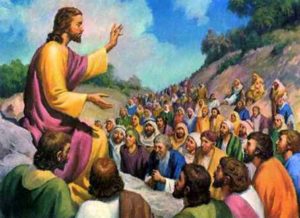Abstract: The incredibly long ages attributed to the biblical patriarchs in Genesis has baffled many a Bible student for ages. In a time when even the most advanced medicine and fitness and health programs can get you to up to 120 years old if you’re lucky, it seems to stretch credulity to believe that the earliest humans could live several times that long. Christians committed to The Bible may simply bite the bullet and say “The Bible says it. I believe it. That settles it.” or attempt to explain how people of the antediluvian period could live so long but then, for some reason, the lifespan dropped after the flood. However, what if all this speculation and puzzling over the long ages is based on a false presupposition; that these were intended to be the sum total of solar years the biblical patriarchs lived? In this paper, I will make the case that the original author and audience did not take these ages to be literal sums of solar years the characters lived, but that the numbers carried special symbolic significance. Numbers had special meanings to the biblical authors, and they employed them in a number of ways to telegraph certain points.
Are The Numbers Really Random?
A casual examination of the ages reported in this chapter seems random. Adam lived to be 930, Mahalalel lived to be 895, Jared kicked the bucket after 962, and of course, Methuselah lived to be a whopping 969. The numbers of 930, 895, 962, 996 don’t seem connected or seem to be odd in any sort of way, so the average reader automatically thinks that the reason the numbers are the way they are is that this just so happened to be the ages at which these people died. However, this is because we think of numbers in base 10. If the numbers reported were all “round” numbers like 500 or 1,000, something would immediately go off in our heads. “Wait a minute”, we’d think to ourselves, “these people just so happened to die at base 10 numbers? What are the odds?” It would seem implausible to us and we’d think that there’s something more to the numbers given than a mere reporting of ages. Well, it turns out that these numbers in Genesis 5 do have peculiar characteristics when you dig a little deeper. This is going to get very complicated, so put on your thinking cap, and read slowly and methodically.
Biblical Numerology
Biblical numerology gets a bad rep in a lot of Bible study circles. This is because people can abuse it to come up with all sorts of “code messages” embedded in scripture, and some of these have been used to predict things like the date of Jesus’ return. However, it would be a mistake to deny that numbers are used symbolically in scripture just because people take the concept and run away with it. That is no more valid than dismissing The Bible as a whole because of how it has been misused. The fact is that numbers did have significance to the biblical authors as they did to the rest of the ancient world. In a previous paper in this series, I talked about how the number 7 carried the notion of “completion” in The Bible, and that this is why it was frequently used in religious service settings and in the creation of the world, which I argued was an inauguration of the universe as God’s temple.1 There are other areas where the number 7 carries special significance, as Brian G. Chilton writes “7 is one of the most important numbers in the Bible. It symbolizes completion, perfection, and rest. God finished creation in 7 days. There are 7 great land masses. 7 colors of the rainbow. 7 notes make a perfect scale. 7 days in the feast of Passover. 7 weeks between Passover and Pentecost. 7 days for the Feast of Tabernacles. God had 7 covenants with humanity (Adamic, Noahic, Abrahamic, Mosaic, Levitic, Davidic, and Messianic). In Revelation, one finds 7 churches, 7 letters, 7 candlesticks, 7 stars, 7 angels, 7 Spirits of God, 7 Seal Judgments, 7 horns, 7 eyes on the Lamb, 7 trumpets, 7 thunders, 7 mountains, 7 bowls, 7 kings, and so on.”2 Of the number 40, Chilton writes “Symbolizes testing and trials. Genesis notes that it rained 40 days and 40 nights upon the earth during the time of Noah’s testing. Moses was in Egypt 40 years, in Midian 40 years, and served God 40 years. Moses was on Mt. Sinai 40 days as God gave him the law. Saul, David, Solomon, and Josiah ruled for 40 years. Israel was in the wilderness 40 years. Jesus fasted in the wilderness 40 days. Jesus taught his disciples for 40 days following his resurrection.”3
From these two examples of Chilton’s alone, we can see that numbers are rarely accidental features of the biblical text. This isn’t to say that every example of numbers in The Bible are literally false, for example, it isn’t to say that Israel and Jesus didn’t literally spend 40 years and days in the desert respectively, it didn’t really rain for 40 days and 40 nights, that Jesus didn’t really instruct His disciples 40 days after the resurrection. God could have providentially arranged these historical events to occur for a duration of numerical significance.4 Of course, in other cases, the numbers could be non-literal, and purely symbolic. Whether the numbers are significant and literal at the same time, or significant but non-literal, one has to do a case-by-case study.
What’s interesting is that numbers carry symbolic meaning even in our own culture. If I told you Jen Ledger is a 10, we wouldn’t interpret this to mean that she’s a little girl. Instead, I just find her extremely attractive. If I say “I’ll be there in 5 minutes”, you wouldn’t accuse me of being tardy if I hadn’t arrived after 300 seconds. You would instead realize that 5 is a symbolic representation to mean I’ll be arriving shortly.
Genesis 5 Ages: Literal Or Symbolic Only?
BioLogos blogger Jim Stump writes “The question is whether it is a better explanation to interpret the numbers as having some symbolic or rhetorical significance to the original audience (even if we don’t know what that is), or that they were just a straightforward listing of numbers the way we would use them today. Knowing what we do about the culture, and in the absence of any persuasive reasons for thinking that the ages of these men were so radically different than they are today, it seems that a symbolic or rhetorical interpretation is a legitimate option and maybe even a preferable one.”5
Michael Jones of Inspiring Philosophy says “Scholars have noted for years that the biblical authors readily use and play with numbers for symbolic means, the most obvious is the genealogy found in the gospel of Matthew where he specifically leaves out duplicates generations in order to get three perfect sets of fourteen, totaling 42 generations from Abraham to Christ. No one can be true to the text and assume Matthew is being literal. It is clear when you read the genealogies in Chronicles. This is not recognized by scholars as a blunder on Matthew’s part, but an attempt to use numbers to express a symbolic message that Jesus is the messiah.”6
Michael Jones of Inspiring Philosophy says “7 is a number that shows up multiple times in Genesis to indicate God’s perfect rulership or completion. …there was a strong indication that the ages of several of Israel patriarchs were ideal numbers and not their literal ages. Kenneth kitchens notes the odd age of Joseph and Joshua, who both have a strong affinity with Egypt. Both men are said to have lived to the age of 110, The ideal age and Egyptian inscriptions. Essentially, the biblical descriptions are saying that both men lived the perfect Egyptian life.”7
On top of this, Craig Olson wrote a paper on the patriarchs giving reasons for why the ages cannot be literal. One example Olson gives is Genesis 25:8 which says “Abraham breathed his last and died in a good old age, an old man and full of years, and was gathered to his people.” – Genesis 25:8
In the verse immediately prior that Abraham lives to be 175 years old (Genesis 25:7). Now, if the extremely long ages of Adam Seth, Enosh, Keenan, and the others were literal, then this means that Abraham died extremely young compared to them. Yes, he would be an old man when he died by our modern standards, but compared to someone who died at nine hundred years old, he would have died extremely young. 175 would be like a baby to those who live close to a thousand years old. As Michael Jones of Inspiring Philosophy says in his video that I have quoted twice above, Abraham’s death would have been seen as a travesty and a sign that humans were decaying as a result of the Fall. If the Ages were literal, it makes no sense to say that Abraham died at a good old age. It would be like if we said that someone today died at a good old age if they died at the age of 25 instead of 80. While that may be a long time in dog years, it is very short by human standards.
In Genesis 17:17, we read “Then Abraham fell on his face and laughed and said to himself, ‘ shall a child be born to a man who is a hundred years old? Shall Sarah, who is 90 years old, bear a child?” But if the ages in Genesis 5 were literal, it would make no sense for Abraham to laugh. Abraham would be well aware that many of his ancestors were born after their fathers were well past the age of 100. Genesis 5:18 says that Jared was 162 years old when he fathered Enoch, for example. So Abraham should have been like “100? No big deal.” And yet, Abraham seems to be under the impression that people who are 100 years old cannot father children. This implies that the ages in Genesis 5 are not meant to be taken literally, but metaphorically.
As Nathan M Sarna explains “It is clear the biblical chronologies of the patriarchal age are not intended to be accurate historical records in our sense of the term… The numbers used are an expression of the biblical interpretation of history as the unfolding of the divine plan on the human scene.”8
The Significance Of The Numbers In Genesis 5
There are 30 age numbers we can get from Genesis chapter 5—three numbers for each of ten patriarchs: the age when a son was born, the number of years the patriarch lived after the son was born, and the total number of years the patriarch lived. For example, “When Adam had lived 130 years, he became the father of… Seth. The days of Adam after he became the father of Seth were 800 years… Thus all the days that Adam lived were 930 years” (Genesis 5:3-5). The Bible presents us with similar accounts of Seth, Enosh, Kenan, Mahalalel, Jared, Enoch, Methuselah, Lamech, and Noah.
If you add up the numbers of the patriarchs from Adam to Moses, you get 12,600. Inspiring Philosophy says “The ages are not coincidental. Moses brings Israel into the Promised Land which was viewed by Israel as a new Eden. So, from Eden to Eden, you have a symbolic number show up to symbolize God’s preparing to bring his people back into a land where his presence resides. The age of Moses is one of the most obvious cases of symbolism Deuteronomy 34:7 says ‘ Moses was 120 years old when he died. His eye was undimmed, and his vigor unabated.’ As we noted, this is an ideal number as in the biblical texts and In The City of Emer.” 9
Inspiring Philosophy goes on to quote Meir Bar-Ilan who wrote in “When Being Numerate Used To Mean Something Else”, page 415, that “… Moses his corporeal talents were perfect until his very last date, and it looks as if the whole number of 120 Denotes some kind of perfection. No doubt, the number 12 denotes time, since there were always 12 months in a year, so 12 denotes A whole circle of time and a complete circle denotes perfect by itself… And it is clear that 10 denotes corporeal talents, because each has 10 fingers.”
In other words, there’s a reason why it is said that Moses died at 120 years. His talents were perfect until the end of his life.
With all this in mind, let’s turn back to the genealogies and Genesis 5. Kenneth Matthews notes the ages in Genesis 5 vary between the Masoretic Text, the Septuagint, and the Samaritan pentateuch. This is a problem for inerrancy if the ages are meant to be literal, but if they’re for the purpose of theological messaging, then there’s no problem at all. Anymore than there’s a problem then the way Matthew plays with the numbers in the genealogies of his gospel.
But why exactly are they so different in these textual traditions? Well, Michael Jones in his video says that it’s probably because of a cultural norm that the numbers were fluid, meaning they can be adjusted for theological significance. Should this trouble us though? Does this mean that the text isn’t concerned with truth? No. Just because a record isn’t literal, that doesn’t mean it’s not true. This is stinkin’ thinkin’ that fundamentalists have a hard time jettisoning. If the ages in Genesis 5 are metaphorical, that doesn’t mean they’re any less valuable, it doesn’t mean the text is lying or in error, and it certainly doesn’t mean the people in the genealogies didn’t exist.
Perhaps you’ll find comforting, as I did, the words of R.R Wilson, who Inspiring Philosophy quotes in his video on the subject. Wilson said “Even though the genealogies may be fluid and tendentious, they are still valuable historical sources provided their nature and functions are taken into account. In addition, in a number of cases, when we compared parallel genealogies, we found them to be identical, so until we have evidence to the contrary, let’s consider them to be accurate and potentially valuable historical sources .”10
Some object to the numbers being metaphorical and symbolic because they appear to be random, but that is because we use a base 10 system. The ancient Israelites used a base 60 system. This ancient system is where we get 360 degrees and A circle, 60 seconds in 60 minutes in an hour.
Inspiring Philosophy notes that a lot of the ages are divisible by 5. See below.

Table 1: 21 of the 30 ages are divisible by 5. Taken From Inspiring Philosophy’s video “Genesis 5: A 900 Year Old Man?”
Inspiring Philosophy notes that another 8 become divisible by 5 by detracting 7. See below.

Table 2: 8 of the ages become devisible by 5 by subtracting 7.
Methusaela’s age also is divisible by 5 if you add multiples of 7. Kenton Sparks says it’s .00000006% possible that the numbers should just line up with a 0, 2, 5, 7, and 9. This is not an accident.
We can’t know what each individual number means with certainty, but we can make some reasonable inferences by considering some of the numbers. The numbers are intended to convey something about their character; how holy they were, how virtuous, how intelligent they were, how sinful they were, etc. Inspiring Philosophy takes Enoch as an example. He’s said to have died at 365 years, and is “The seventh from Adam”. 365 is the number of days in a solar year, and as previously mentioned in this paper and others, 7 is the biblical number of completion. So we can know that the author of Genesis is trying to telegraph that Enoch was complete in some way? How so? Well, Genesis 5:22–24 says, “After he became the father of Methuselah, Enoch walked faithfully with God 300 years and had other sons and daughters. Altogether, Enoch lived a total of 365 years. Enoch walked faithfully with God; then he was no more, because God took him away.” Hebrews 11:5 gives a little more detail: “By faith Enoch was taken from this life, so that he did not experience death: ‘He could not be found, because God had taken him away.’ For before he was taken, he was commended as one who pleased God.” Perhaps the combined numbers of completion (7 and 365) are meant to convey that Enoch was completely pleasing to God, bordering on being a perfect human. Enoch was such a good man, that God didn’t even allow him to experience death before transitioning him to the afterlife!
Lamech’s (Seth’s descendent) lived a total of 777 years. He boasted a 77 fold vengeance. Lemach is the son of Methusala. Methusala’s Gematria is 777. This might represent Lamach’s moral character for blessing Noah the flood hero (Genesis 5:29).
Conclusion
We don’t need to be embarrassed by the long ages in Genesis 5. They aren’t presenting us with literal ages, and were never intended by the author of Genesis to be taken that way. Instead, the author of Genesis employs numerology to telegraph the important character traits of the characters.
—————————————————————
NOTES
1: Evan Minton, “Genesis 1: Functional Creation, Temple Inauguration, and Anti-Pagan Polemics” – https://www.dropbox.com/s/447sx9azjp1v8q3/Genesis%201%20-%20Functional%20Creation%2C%20Temple%20Inaguration%2C%20and%20Anti-Pagan%20Polemics.pdf?dl=0
2: Brian Chilton, “Reference Guide To Biblical Numerology”, January 13th 2018, — https://crossexamined.org/reference-guide-biblical-numerology/
3: ibid.
4: I think Molinism is the best view of divine providence out there. See Tim Stratton’s blog post “What In The Possible Worlds Is Molinism?” for a brief explanation → https://freethinkingministries.com/what-in-the-possible-worlds-is-molinism-2/
5: “Long Life Spans in Genesis: Literal or Symbolic?” By Jim Stump on October 5, 2017 — https://biologos.org/articles/long-life-spans-in-genesis-literal-or-symbolic/
6: Inspiring Philosophy, “Genesis 5: 900 Year Old Man?”, November 8th 2019, — https://www.youtube.com/watch?v=uoPbZnRN8xQ
7: ibid.
8: Nathan M. Sarna, “Understanding Genesis: The World of The Bible In The Light of History”, page 84
9: Inspiring Philosophy, “Genesis 5: 900 Year Old Man?”, November 8th 2019, — https://www.youtube.com/watch?v=uoPbZnRN8xQ
10: R.R Wilson, “Genealogy and History In The Biblical World”, Page 133
Share this:
- Share on Facebook (Opens in new window) Facebook
- Share on X (Opens in new window) X
- Print (Opens in new window) Print
- Email a link to a friend (Opens in new window) Email
- Share on Pinterest (Opens in new window) Pinterest
- Share on Reddit (Opens in new window) Reddit
- Share on LinkedIn (Opens in new window) LinkedIn
- Share on Tumblr (Opens in new window) Tumblr
Discover more from Cerebral Faith
Subscribe to get the latest posts sent to your email.





Don’t be an idiot. This is an example of Greek Platonic thinking (Jews seek physical signs, and Greeks wisdom, as Paul says), that because numbers are special, that the text conforms to the numerology.
No, the numerology is set by having actual physical representations. The physical actuality determines the numerology, this is the Hebraic way. Without the physical, there is no specialty assigned to the numbers. The Platonic solids and ideals are not pie in the sky, they are on earth, in reality, they determine the numerology. The actuality of the physical Creation week and ages of men determines the numerology, not the other way around. If the actuality is changed, then the numerology changes.